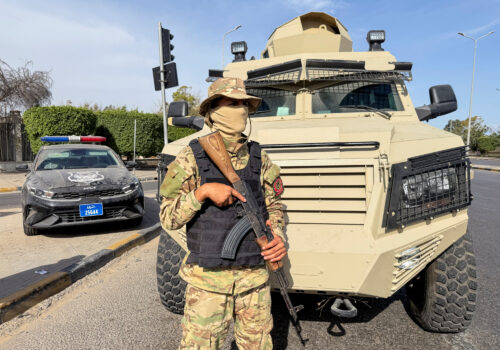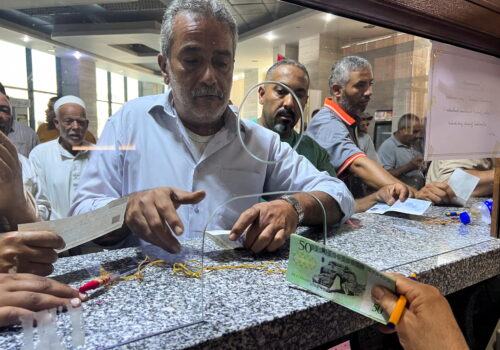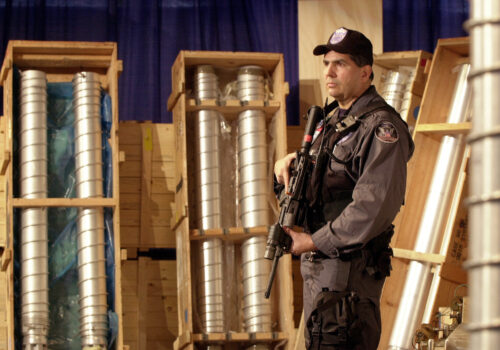Beyond ceasefires: Reimagining stability and engagement in Libya
The past fortnight has shattered perceptions of stability in Libya, unveiling deep fractures within its political, security and economic state and non-state apparatuses.
The May 12 assassination of Abdul Ghani al-Kikli, prominent leader of the Stability Support Apparatus (SSA), triggered large-scale urban confrontations between rival armed factions, but this came as no surprise. The escalation occurred against the backdrop of powerful semi-state armed factions, duplicated executive and legislative institutions alive long past their mandate, an absent judiciary, a nationwide economic crisis, and pervasive corruption. Coalitions formed on the basis of affiliations to the Government of National Unity (GNU) on one side, and Special Deterrence Force (SDF) on the other, drew in militants from Tripoli and beyond, bringing to light grievances and mistrust accumulated over years of fluid, ever-changing, short-term security arrangements and international neglect.
Indeed, the notion that the dual status quo could endure since the 2020 Ceasefire Agreement between the military factions of the then-Tripoli-based Government of National Accord (GNA) and the Benghazi-based Libyan Arab Armed Forces of Khalifa Haftar, with its multiplied leaders unchecked, can no longer hold in public discourse.
Countrywide divisions are also resurfacing as Tripoli grapples with its own, with chaos in Libya’s capital creating an ideal battleground for those seeking to achieve nationwide domination through military means.
Beyond the ballot box
Currently envisaged solutions to Libya’s crisis feel like a band-aid on a gunshot wound. Crisis appears to be brewing as tensions deepen and fears mount of further violent escalation in urban areas. The United Nations and the Presidency Council launched a truce committee to negotiate a local ceasefire and interim security arrangements in Tripoli, whose influence over peace enforcement in practice is, however, limited at best. At the same time, the House of Representatives, whose members were last elected in 2014 and have long overstayed their mandate, seized the opportunity of undermining the also-entrenched GNU and launched its own process for forming yet another executive.
The international push for elections in 2021 was seen as the most promising avenue towards stability. However, as the ballot box was never opened, the profound depth of Libya’s legitimacy crisis across all existing executive and legislative institutions perdures today. Indeed, no single individual or institution in Libya would be able to meaningfully bring the country to elections without due process and international backing. What’s more, any attempt at the implementation of new political arrangements amid the current escalation risks resulting in more violence, including towards civilians. Peace enforcement, therefore, rises to the front as the utmost imperative for the international community in the short term, while paving the way for a complete political overhaul in the medium term.
While it’s clear that an international agreement is needed to support Libyans in reversing current negative trends and overall escalation, no single external actor can be a viable mediator without multilateral backing. While in other contexts, the United Nations could consider deploying an international peacekeeping mission, permanent members’ interests at the Security Council amid changing Mediterranean geopolitics would likely lead to a deadlock and the use of veto power(s) for such an initiative. A way out of the current institutional blockage—Libyan and multilateral—must therefore rely on other pathways to multilateral cooperation.
SIGN UP FOR THIS WEEK IN THE MIDEAST NEWSLETTER
With the United Nations gridlocked and unilateral interventions only deepening Libya’s divides, the question of who, if anyone, could credibly enforce peace looms large. Egypt, despite its strategic clout and dual membership in the African Union and League of Arab States, is too closely aligned with eastern factions to lead. Turkey is disqualified on similar grounds, its deep entrenchment in Tripoli rendering it a partisan actor, despite recent meetings suggesting a possible rapprochement with Eastern factions. While symbolically inclusive, the Union for the Mediterranean lacks both Libya’s full participation and any enforcement teeth. The European Union, though equipped with resources, remains hamstrung by internal divisions and a migration-centric agenda. Meanwhile, the Security Working Group—gathering key Western and regional actors—has political weight but no mandate. As Libya’s instability never stays within its borders, its African and European neighbors remain most exposed to renewed spillovers, while none of the major external backers, from Russia to Turkey, ultimately benefit from continued escalation.
Breaking the stalemate
This begs the question: What might peace enforcement look like in Libya’s current politico-security landscape? The question is complex, given the internationalized nature of interest-based politics hampering Libya’s stability.
Given these limitations, few paths can be deemed viable for the weeks ahead. For the proponents of traditional multilateral approaches to peacebuilding, the most viable path forward may lie in a time-bound African Union-led initiative, co-endorsed by the League of Arab States, and supported by a coordinated diplomatic and operational role for the European Union and Egypt. The Security Working Group could serve as the core forum where such a framework is negotiated and designed, leveraging its existing membership and political clout. A hybrid mechanism of this kind, though likely to require extensive negotiations in its inception, could prove successful in beginning to reverse escalation and lay the groundwork for a more durable political—and peace—process.
For the proponents of rapid bilateral solutions, another path could be relying on a smaller coalition of involved States to intervene with the goal of keeping peace. A riskier but faster-to-deploy setup could for instance involve the likes of Turkey, Egypt, Algeria and a southern European State—one that is agreeable to the United States—in an interim entente of influence over Libyan stakeholders (and spoilers), each deterring them from further escalation until a new political process takes form.
While constraints faced may hamper its effectiveness, the United Nations and its support mission must remain central in any process, as the holders of Libya’s peace negotiations and guarantors of international legitimacy. Indeed, while both paths proposed may help break the current stalemate (albeit with different risk levels), they must be designed as a bridge, not an alternative, to a reinvigorated UN-led political track. Given the financial strain the UN system has faced in recent months, the proposed interim models could offer a much-needed breathing space to reassess, alongside key partners, the trajectory and structure of the process ahead.
Ultimately, Libyans must define the terms of their political future, which will require more than elections alone. With all major political institutions mired in crisis, a renewed approach could involve sequencing parliamentary elections first, under a model in which executive authority is shaped by parliamentary legitimacy. A technocratic, legitimacy-grounded constitution-writing process could then follow. Crucially, a new oversight phase must be introduced—one that is multilateral, time-bound, and rooted in local ownership—to shield the process from spoilers, prevent backroom power grabs, and guarantee that implementation matches intent. Only then can a political transition begin to gain the resilience Libya so urgently needs.
Karim Mezran is a Resident Senior Fellow and director of the North Africa Initiative at the Atlantic Council.
Roberta Maggi is an Associate Fellow at the Center for Applied Research in Partnership with the Orient (CARPO).
Further reading
Fri, May 16, 2025
The killing of Abdul Ghani al-Kikli may be a turning point for Libya
MENASource By
The killing is considered to be part of a push to eliminate influential militia leaders and consolidate GNU loyalist control over Tripoli.
Wed, Apr 16, 2025
Solving Libya’s economic collapse will require confrontation—not consensus
MENASource By Emadeddin Badi
If the status quo continues, the next phase of Libya’s crisis will not be quiet erosion. It will be public revolt.
Wed, Apr 30, 2025
From Tripoli to Tehran: Lessons from Libya in US-Iran nuclear talks
MENASource By
Twenty-one years later, the nuclear disarmament of Libya serves as a model for the United States in current nuclear negotiations with Iran.
Image: Demonstrators demand the overthrow of the Libya's Government of National Unity headed by Abdulhamid al-Dbeibah, in Martyrs' Square in Tripoli, Libya, May 23, 2025. REUTERS/Ayman al-Sahili


